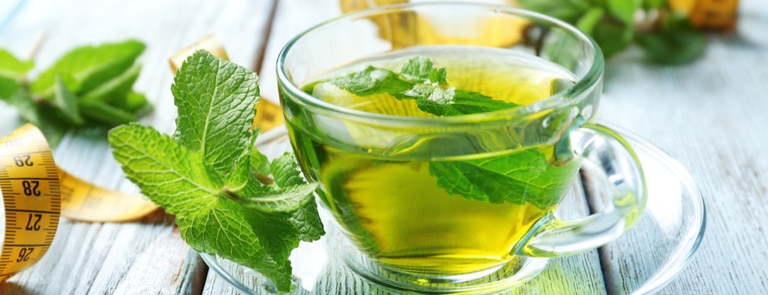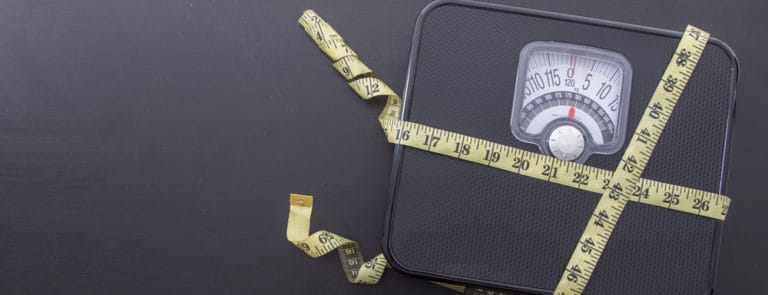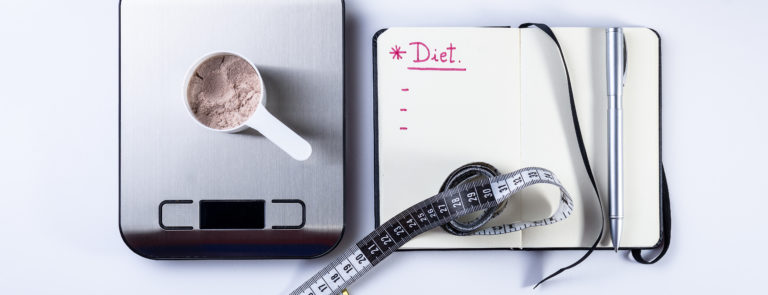15% off €25
Does slimming tea actually work?

We tend to think that slimming tea is a new phenomenon, ushered in by the 21st-century wellness craze and image-obsessed internet culture.
This couldn’t be further from the truth, with the ingredients in modern herbal slimming tea dating back thousands of years and have been used across the world to promote good health.
What do we mean by a slimming tea?
Tea marketed as slim tea is usually a blend of black tea, white tea and herbal teas. Ingredients are chosen based on their supposed weight-loss causing properties. These include faster metabolism and suppressed appetite.1
Different types of slimming tea
There are different types of slimming teas, which claim to work in different ways.
-
Metabolism-boosting
The claim with this type of tea is that they offer a temporary boost in metabolic rate- which refers to the amount of calories you’re able to burn at rest. This can help support weight loss by burning a few extra calories each day, adding up to weight loss over time.2 Caffeine and green tea are common ingredients.
Possible side effects include: rapid heartbeat, nausea and anxiety
-
Appetite suppressing
These teas help reduce the appetite, making you less likely to over-eat.
Some common slimming tea ingredients, such as fenugreek, are thought to have appetite suppressing properties – but only fenugreek seeds which contain lots of fibre.3
Also, just by drinking tea you’re taking on water, which is always good in terms of stopping you feeling excessively hungry.
Possible side effects include: some ingredients, such as garcinia cambogia, can cause symptoms including headaches and diarrhoea.4
-
Diuretic
This type of slimming tea work on the principle of encouraging you to pass urine more often, meaning you will technically lose weight in the form of water. High-caffeine teas tend to have a diuretic effect.5
Diuretic teas may also be marketed as a form of detox aid.
Possible side effects include: dehydration and muscle cramps
-
Laxative
These teas make you need to ‘go’. Usually containing a laxative like senna leaf, these teas stimulate the muscle activity of your intestines to cause a bowel movement.
The weight lost is not fat – it’s water, minerals, electrolytes, and indigestible fibre and wastes from the colon.6
These teas are not recommended for long-term use and can be harmful if used consistently over time.
Possible side effects include: stomach cramps and diarrhoea. If used excessively, laxatives can lead to colon damage.
Common ingredients in slimming teas – and the science behind them
-
Green tea
One of the best slimming tea ingredients, green tea is found in many diet tea blends.
Green tea contains catechin which has been shown to boost metabolism and help the body burn fat.7,8
You might also see matcha tea on an ingredients list for slimming tea - matcha is a form of concentrated green tea.
-
Caffeine
Found in many weight loss teas, caffeine consumption has been linked with a reduction in fat mass in some people.9
Further, high amounts of caffeine have been linked with a temporary increase in metabolism by up to 13%, which could lead to weight loss over time.10
-
Peppermint tea
Just the scent of peppermint alone can reduce hunger levels.11
In one study, drinking peppermint juice led to weight loss in 43.8% of the people who participated.12
This cooling tea can also help promote good digestion, which in turn can help with weight loss. In fact, people across the world have enjoyed peppermint tea after meals as a digestive aid for centuries.
-
Oolong tea
Well-known as a Chinese slimming tea, oolong is made from the same plant as black tea, green tea and white tea. The difference is in its preparation, which involves drying, fermenting and oxidizing.
A Chinese study published in 2009 found that oolong tea helped people decrease body fat content and reduce body weight over six weeks.13 It’s thought this is down to oolong stopping your body from absorbing as much fat from food.
It’s worth bearing in mind that the subjects in this study consumed 8 g of oolong tea a day for 6 weeks – more than you’d get from weight loss teas alone.
-
Ginger
Ginger can help boost metabolism by enhancing thermogenic effect of food – meaning we burn more calories eating the same diet when we supplement with ginger.14
Ginger might also be able to help reduce feelings of hunger, making it a great ingredient to have in a tea if you’re trying to lose weight.15
-
Yerba mate
Native to South America, this smoky leaf tea is extremely popular Paraguary, Uruguay and parts of Brazil. It contains as much a caffeine as coffee, which could partially account for its ability to boost metabolism.
One study showed that drinking yerba mate led to weight loss in overweight people in 12 weeks, compared to overweight people who didn’t drink it.16
-
Garcinia cambogia
This is a fruit eaten across South and South East Asia.
Scientists have found that HCA – an active ingredient in garcinia cambogia - can help to metabolise fats in the body, as well as acting as an appetite suppressant.17
Other studies have pointed to the efficacy of garcinia cambogia as a weight loss aid, too.18
-
Liquorice
It’s thought that adding liquorice to the diet can help with weight loss. One study showed liquorice was able to reduce body fat mass without changing anything else about the diet.19
-
Senna leaf
Senna leaf works by stimulating the muscles that line the gut, helping them move stool along and encourage a bowel movement.20
Teas containing senna leaf can be an effective short-term solution to constipation. However, these aren’t recommended for long term use, and can actually damage your gut health if taken too regularly.
Things to watch out for
As with any health product, beware of ‘miraculous’ claims.
Even if a study was done under optimum conditions, there might be other factors at play which affect the results. For example, people who drink weight loss teas might be more likely to weigh less than people who don’t – but they could also be more likely to drink more water, be more active, and choose healthier foods in general.
Also, some studies are based on the activity of the tea in a test tube, not in a real human subject.
Does slimming tea really work?
Nutritionist Alexander Thompson says:
“It’s important to remember that the main effect for weight loss comes from sensible changes to a person’s diet. However, slimming teas are useful to give a helping hand, especially in the early stages of a weight loss program when you’re yet to establish better diet habits.
Slimming teas are also great to drink pre-exercise, as their stimulant effects supporting physical energy levels and mental focus, reducing perception of fatigue and allowing you to exercise harder, therefore burning more calories.”
The bottom line is - slimming tea can’t cause you to lose weight if you’re taking in more calories than you’re burning.
But by potentially helping you burn fat, curb your appetite, beat constipation and boost your metabolism, slimming teas – when used safely- can support your healthy diet and help you lose more weight than you otherwise would.
Last updated: 13 April 2021
- https://www.medicalnewstoday.com/articles/319402
- https://pubmed.ncbi.nlm.nih.gov/2912010/
- https://pubmed.ncbi.nlm.nih.gov/19353539/
- https://www.ncbi.nlm.nih.gov/pmc/articles/PMC5143754/
- https://pubmed.ncbi.nlm.nih.gov/19774754/
- https://www.nationaleatingdisorders.org/learn/general-information/laxative-abuse
- https://www.ncbi.nlm.nih.gov/pmc/articles/PMC4258944/
- https://pubmed.ncbi.nlm.nih.gov/23021155/
- https://pubmed.ncbi.nlm.nih.gov/31021710/
- https://pubmed.ncbi.nlm.nih.gov/14684395/
- https://www.aeroscena.com/pages/research-oils-30
- https://www.scielo.br/pdf/cta/v31n3/a06v31n3.pdf
- https://link.springer.com/article/10.1007/s11655-009-0034-8
- https://www.ncbi.nlm.nih.gov/pmc/articles/PMC3408800/
- https://www.ncbi.nlm.nih.gov/pmc/articles/PMC3408800/
- https://pubmed.ncbi.nlm.nih.gov/26408319/
- https://jamanetwork.com/journals/jama/fullarticle/188147
- https://www.ncbi.nlm.nih.gov/pmc/articles/PMC4053034/
- https://www.researchgate.net/publication/5378458.
- https://www.nhs.uk/medicines/senna/



